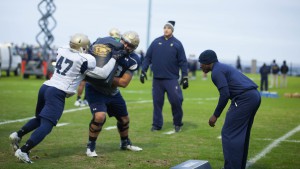On September 26, 2014, Isaiah Langston, a student at Rolesville Road High School, collapsed on the football field, hours before his Friday night football game. Langston, 17, died on September 29, 2017 at WakeMed due to “complications of vertebral artery dissection due to blunt force injury of the head and neck”. Langston received the fatal injury two days before on September 24 and had complained of a headache, but was on the field for the pre-game warmup on Friday.
In the first few days of November, the Wake County public school system reached a settlement with Langston’s family, who was suing the school system for careless and negligent actions against the defendants, Tommy Moore, Rolesville’s athletic director, and Jermaine Evans, the head football coach at the time, to name a few.
Langston’s injury and death occurred two weeks after NFL Commissioner Roger Goodell was in Wake County to promote “Heads Up Football”, an NFL sponsored program that promotes safe tackling techniques and puts coaches through a thorough program that trains them for injury, recognition and prevention.
Wake County became the first North Carolina district to adopt the “Heads Up Football” program in 2014, and more districts have been added to the list since then. High schools with trained “Heads Up Football” coaches have experienced 88% lower rate of concussion in practice, 57% less injury rates across all injuries in games, and 43% lower time-loss injury rates in practice.
The effectiveness of the program is clearly proven in the statistics, and “Heads Up Football” and programs like it have impacted players all over the nation and Leesville Road High School football players closer to home.
Coaches are the heads of all teams, no matter how big or small. “[Our coach] tries to make us as fit as possible, and he teaches us the correct techniques to tackle, like not leading with your head into an offensive player, or whoever you’re tackling to prevent concussions,” said Zayne Naseer, a sophomore varsity football player at Leesville Road High School.
An increase in education has also helped the players in preventing injuries. “[These steps] definitely have helped because we haven’t had as many injuries this season, and the little we’ve had have been minor, [the player] only being out for a week or two,” said Naseer.
High school football players like Naseer have been taught not to aim for their opponents head and stay hydrated, which are the most basic steps a football player can take to avoid a possibly fatal injury.
Another basic step to prevent injuries and cramps on the field is stretching. “This year we were stretching a lot more, and we experienced less injuries,” said Josh Lowery, a junior varsity player at Leesville Road High School.
But some football players, like Naseer think that even with the current education that is implemented into the players’ mindset, it is still not enough, because there is a difference between education and common sense. “We’ve had a lot of stupid injuries, like in the locker room. There is a lot of messing around, and a few people have gotten hurt,” said Naseer.
In other words, reckless injuries can easily be avoided. “Athletes need to know what the consequences of their actions when they’re playing on the field,” said Naseer. Even with one player gone, the whole team takes a toll.
Before returning to practice after a concussion, the player must follow guidelines laid out by the NCHSAA, which include recognition, diagnosis and post concussion management. After a player has been cleared by a certified doctor, they are put through a series of fitness tests that start off with cardio, and they increase in difficulty with everyday that goes by. Then, helmets are added into the equation, until the player is able to play full time.
In addition to implementing strict concussion and injury guidelines, Leesville football coaches have set up a jersey system for injured players to protect them during practices. “ [Leesville] has a jersey system, so a red jersey means you can’t practice, green jersey means you can practice without contact, and no jersey means you’re good to go,” said Lowrey.
The importance of following rules and not making foolish decisions is vital for the success of any athlete, especially with a high contact sport like football, which can prevent football related tragedies like Langston’s story. Basic steps include following rules, preparing for practice, and being able to recognise if you or a teammate has symptoms of a concussion, to name a few. These simple steps will help reduce the 67,000 cases of concussions annually and other football related injuries.

Leave a Reply